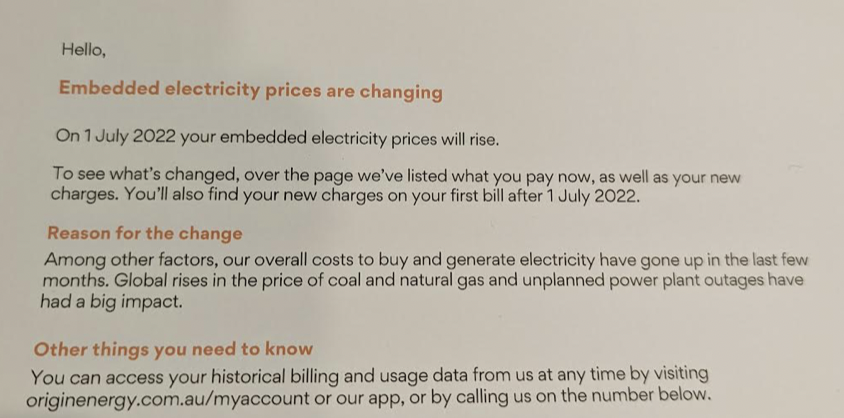
A screenshot of the letter from Origin Energy. Some Canberrans who live in apartments have found out they are stuck paying higher prices because they are locked into embedded energy networks. Photo: Screenshot.
When the ACT’s regulator announced earlier this month that local households would enjoy lower electricity bills even as the rest of the country faces steep hikes, Canberrans breathed a sigh of relief.
But for some, that relief was short-lived when they received a letter from their electricity providers last week.
Ben, who lives in a large apartment complex in the Inner North, will be facing price hikes of 18 per cent from 1 July.
According to the letter sent to him by his provider Origin Energy, the reason for the increase is that it’s become more expensive to buy and generate electricity.
“Global rises in the price of coal and natural gas and unplanned power plant outages have had a big impact,” Ben’s letter read.
Initially, Ben was surprised. Like everyone else, he’d assumed his power bills would simply decline in line with the regulator’s announcement.
Turns out that’s not the case, though, as not all electricity providers are tied to that regulated price, so he decided to shop around and look for a better deal.
“I was able to find prices which were substantially cheaper,” he said.
But then came another, even bigger surprise – he couldn’t switch providers.
Ben lives in an apartment complex that runs off an embedded network.
These are common in multi-resident complexes like apartment blocks and some retirement homes.
The wiring is configured in a way that lets owners sell energy back to tenants by bulk-buying supply from a retailer or generating energy onsite.
There’s no database on how many embedded networks there are around the country, but the Australian Energy Market Commission estimates around half a million people purchase their power through them.
Ben is annoyed this wasn’t something he was told about upon moving in.
“As an occupant now, I’ve got no choice at all because a contract has been signed by our strata with Origin,” he said.
General manager at Vantage Strata Jarrod Smith said it’s understandable people are annoyed now, but his recommendation to anyone considering buying an apartment or unit is to do the research.
“[Questions about Wifi, electricity, water and gas] are the questions you need to be asking during the purchasing process of your sales agent and legal representative to make sure you’ve exposed that information,” he said.
“When you’ve got an embedded network, yes, you’re essentially stuck with that one provider because of the network and the infrastructure.
“If you try to change, there are usually extensive costs, not to mention the fact you’d have to install your own infrastructure associated with it.”
That isn’t the case for everyone in an apartment or unit, Mr Smith noted, so he encouraged body corporates, owners’ corporations and occupants to shop around if they can.
Once you’re in, Mr Smith encouraged occupants to ensure their Owners’ Corporation was going to market each year to get the best deal.
ActewAGL – the largest energy retailer in Canberra with an 81 per cent market share – confirmed in a statement it does not operate any embedded networks.
A spokesperson for Origin Energy said they only operate a small number of embedded networks in the ACT.
“All of these customers will continue to receive competitively priced Origin plans in line with our best market offers in the territory,” the spokesperson explained.
The tariff, as announced by the ACT’s regulator, only applies to ActewAGL’s regulated standing offer.
“Origin does not offer this tariff and sets its own standing tariffs that reflect the cost of supplying energy to our customer,” the spokesperson said.
“All of these customers [on embedded networks] will continue to receive competitively priced Origin plans in line with our best market offers in the territory. These customers have been paying prices for the past couple of years that have been lower than the reference price and the ActewAGL regulated standing offer.”
You can compare power prices on Energy Made Easy.
Original Article published by Lottie Twyford on Riotact.




